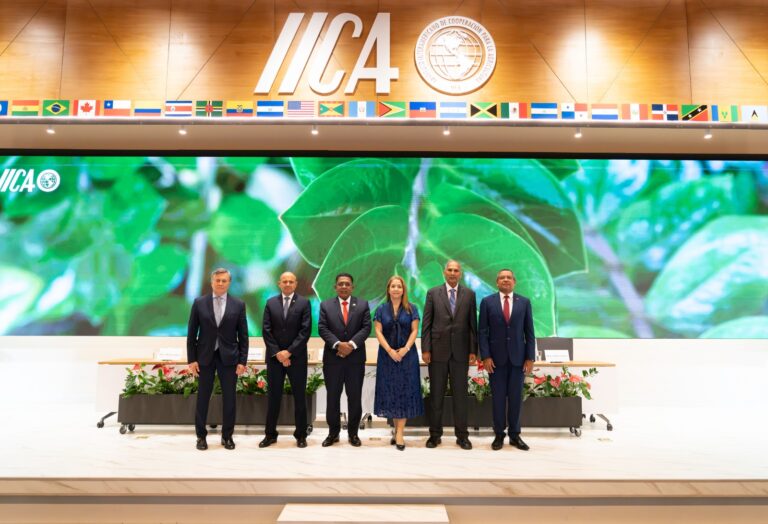A project by IICA has benefited over 60 Colombian families by incorporating forest products to viable business models.
San Jose, July 6, 2015 (IICA). An innovative project implemented in Medellín, Colombia, has helped to increase jobs and income for over 60 rural families and foster their inclusion in the economic and social development of the area, while also promoting sustainable use of native ornamental plants and contributing to the restoration of degraded ecosystems.
This has been possible thanks to the implementation of a model for the conservation, reintroduction and sustainable use of native ornamental species, which includes community participation in the restoration of ecosystems at a park in one of the largest cities in Colombia.
For that purpose, a dome for ornamental plants was built to preserve, reproduce and sustainably use endangered native species, as well as serve as a source of jobs for rural families in the community. The plants enrich the tourist trails in the park and the ones that are grown sustainably are commercialized.

The dome, located inside Arví Park in Santa Elena de Antioquia, is a product of the Sustainable Forestry Management(SFM) Program in the Andean Region, executed by the Inter-American Institute for Cooperation on Agriculture (IICA) with financial support from the Ministry of Foreign Affairs of Finland (MFAF).
According to Tania Ammour, international technical advisor for SFM, the project seeks to integrate communities living inside or close to Arví Park to the management of biodiversity. The locals received training on how to reproduce and care for the plants in order to reintroduce them to the park or commercialize them, with the hopes of creating jobs and income, as well as preventing the illegal sale of forest products.
“There are currently over 60 families producing plants and fostering ecological awareness to reduce illegal extraction activities,” stated the specialist.
Arví Park, located in the Antioquia department, is an ecotourism complex spanning over 2,500 hectares. Visited by over 700,000 people a year, it is a strategic area for the conservation of biological diversity, the recharging of aquifers, and tourism. It is home to 18 anthurium species, 10 bromeliad species and 21 orchid species.
“This initiative shows that it is possible to develop an economic activity that associates organized communities with the management of a park, addresses their common interests, and facilitates the creation of alliances with other organizations,” stated Ammour.
In her opinion, the project addresses one of the main problems of commercializing tropical species, which has to do with profitability: the vast biological diversity of the tropics does not meet market demands. In other words, even though there are many plant species, they are not very abundant, and the market often prefers a single specie in greater volume.
In order to guide the project, a market study was carried out, which facilitated analysis of and decisions regarding how to coordinate processes related to plant reproduction and conservation, environmental education and awareness, the creation of income and tourism. A business plan was also created.
The following are some additional benefits stemming from the project:
- Four direct jobs were created and training were carried out on the management, cultivation and commercialization of ornamental plants.
- Propagation and management protocols for three native species were designed and tested.
- 1,462 orchid, anthurium and bromeliad plants were reintroduced into the ecosystem.
- Technical knowledge on the reintroduction of epiphytes into Andean forests and the identification of species was strengthened.
- Protocols were developed for in vitro and vegetative reproduction of three orchid species, and the standardization of a methodology for asymbiotic germination was carried out.
This initiative was developed through an alliance between IICA, Arví Park Corporation, the Corporation for Biological Research (CIB), the Autonomous Regional Corporation of the Centre of Antioquia (CORANTIOQUIA), the Autonomous Regional Corporation of the Negro and Nare Rivers (CORNARE), the National Training Service, and EAFIT University in Medellín.
The alliance also received support from community associations: the Environmental Association of Service Receivers and Providers of Santa Elena (ARPSE), the Association of Professional Tourist Guides of Arví Park in Santa Elena (ASOGUIARVI) and the Santa Elena Multipurpose Cooperative (COOPASANA).
IICA’s SFM program seeks to achieve greater contribution of forest resources to sustainable development, by eliminating the obstacles that impede development of the forestry sector in Bolivia, Colombia, Ecuador and Peru.
Supported by the MFAF, the program began implementing 24 pilot projects and feasibility studies with the public and private sectors as well as civil society in 2011, and completed those initiatives in 2014. The program is currently at the stage of transferring results for the sustainability and advancement of the most promising innovations.
More information:
manuel.mavila@iica.int
jorge.gonzalez@iica.int










